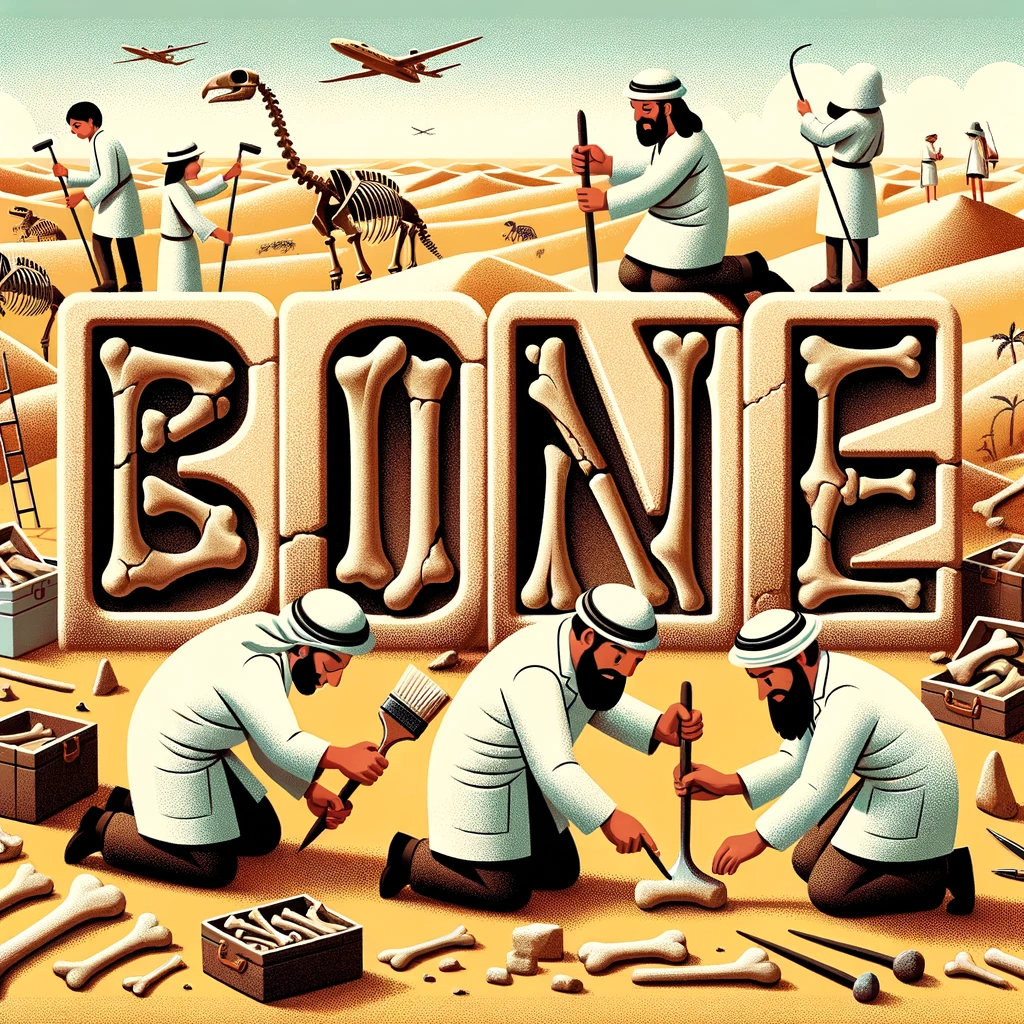Bone
Definition
Bone is used as a noun and a verb. As a noun, it refers to the hard, calcified structure that makes up the skeleton of vertebrates. As a verb, it means to remove the bones from a piece of meat or fish, or to study intensively ("bone up on").
Parts of Speech
- Noun
- Verb
Pronunciation
American English
- IPA Pronunciation: /boʊn/
- Respelling: BOHN
British English
- IPA Pronunciation: /bəʊn/
- Respelling: BOHN
Etymology
The word "bone" originates from Old English "bān," meaning "bone" or "leg." It is related to Old Norse "bein" and Old Frisian "ben," all of which refer to the skeletal structure of animals and humans. Its use has remained consistent in English since the 9th century.
Derivatives
- Boneless (adjective)
- Bonehead (noun, informal)
- Bone marrow (noun)
- Backbone (noun)
- Bone-chilling (adjective)
Synonyms
- Skeletal structure
- Ossature
- Framework
Antonyms
- None
Usage
The term "bone" is commonly used to describe both the anatomical structures within living organisms and objects or materials that resemble these structures. For example, "She fractured a bone in her hand," or "They use fish bones to make broth."
Related Terms
- Skeleton: The framework of bones that supports the body of an animal.
- Marrow: The soft tissue inside bones that produces blood cells.
- Cartilage: A flexible connective tissue found in joints between bones.
Detailed Definitions
Noun
- A hard, calcified structure in the body of vertebrates: Refers to the rigid framework of the skeleton.
- Example: "The femur is the longest bone in the human body."
- The skeletal framework of an organism: Used to describe the structure that supports the body of vertebrate animals.
- Example: "X-rays can show any damage to the bones."
Verb
- To remove the bones from meat or fish: Describes the process of extracting bones from food items.
- Example: "The chef expertly boned the fish."
- To study intensively (informal): Refers to the act of studying thoroughly, especially in preparation for a test.
- Example: "She had to bone up on her chemistry for the final exam."
bone



🇨🇳 Mandarin
- 骨头 (gǔtóu)
- IPA Pronunciation: /kuː˥˩ toʊ˥/
- Respelling: gwu-toe
🇮🇳 Hindi
- हड्डी (haḍḍī)
- IPA Pronunciation: /ɦəɖːiː/
- Respelling: hudd-ee
🇪🇸 Spanish
- Hueso
- IPA Pronunciation: /'weso/
- Respelling: way-so
🇫🇷 French
- Os
- IPA Pronunciation: /ɔs/
- Respelling: os
🇸🇦 Modern Standard Arabic
- عظم (ʿaẓm)
- IPA Pronunciation: /ʕaðˤm/
- Respelling: 'adh-m
🇧🇩 Bengali
- হাড় (haṛ)
- IPA Pronunciation: /ɦaɽ/
- Respelling: haṛ
🇷🇺 Russian
- Кость (Kost')
- IPA Pronunciation: /kostʲ/
- Respelling: kost'
🇵🇹 Portuguese
- Osso
- IPA Pronunciation: /'ɔsu/
- Respelling: ossu
🇮🇩 Indonesian
- Tulang
- IPA Pronunciation: /tuˈlaŋ/
- Respelling: too-lang
🇩🇪 German
- Knochen
- IPA Pronunciation: /ˈknɔxən/
- Respelling: knox-en
🇯🇵 Japanese
- 骨 (hone)
- IPA Pronunciation: /ho.ne/
- Respelling: ho-ne
🇻🇳 Vietnamese
- Xương
- IPA Pronunciation: /sʊəŋ/
- Respelling: suong
🇰🇷 Korean
- 뼈 (ppyeo)
- IPA Pronunciation: /p͈jʌ/
- Respelling: ppyuh
🇹🇷 Turkish
- Kemik
- IPA Pronunciation: /keˈmik/
- Respelling: keh-mik
🇵🇰 Urdu
- ہڈی (haḍḍī)
- IPA Pronunciation: /ɦəɖːiː/
- Respelling: hudd-ee





